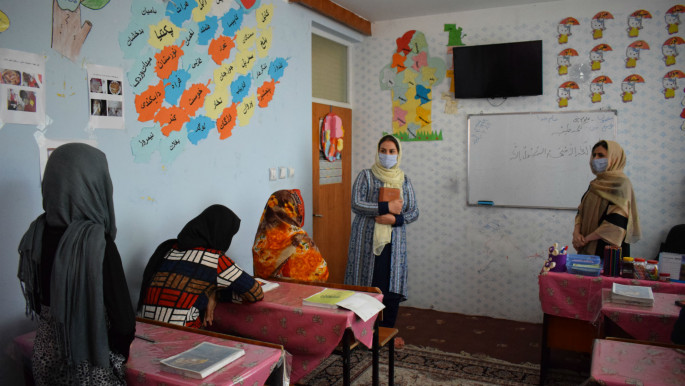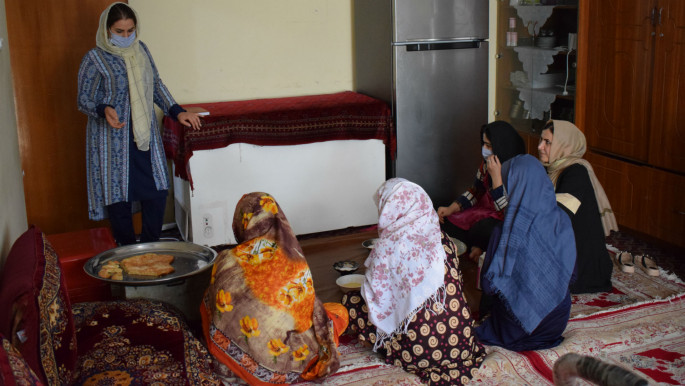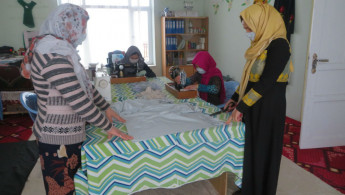Women for Afghan Women: Escaping the shadow pandemic of gender-based violence
In this special series, The New Arab profiles charities, organisations, and initiatives leading the response against the coronavirus pandemic and lending a helping hand to vulnerable individuals and communities. Click here to see other articles in the series.
Last week, the US watchdog for war and reconstruction efforts said that the arrival of coronavirus meant Afghanistan is now facing a health disaster. Results from a sample test of 500 recently carried out in Kabul have shown a third of cases as positive, suggesting the virus is spreading undetected in the country.
Those who disproportionately bear the burden of suffering are Afghan women, according to representatives at Cordaid, a Netherlands-based NGO which works with women's networks in the conflict-ridden country. Those who work in the informal economy will have lost their jobs first as a result of citywide lockdowns.
At home, domestic labour is now harder with children inside and the atmosphere of confinement leads to heightened friction between members of a household. In Afghanistan, as in other countries Cordaid operates, there is parallel increase in domestic violence against women.
Women for Afghan Women
An estimated 87 percent of Afghan women will experience gender-based violence in their lifetime, according to Human Rights Watch (HRW). It is a country-wide phenomena blind to women's socioeconomic status, political affiliation, or ethnic background.
 |
An estimated 87 percent of Afghan women will experience gender-based violence in their lifetime, according to Human Rights Watch |  |
Women for Afghan Women - established in 2001 to support women after the fall of the Taliban - is the largest organisation offering legal and counselling services to victims and survivors of domestic abuse, employing over 900 staff operating in 24 provinces.
Through work with strategic partners as well as the Afghan government, WAW seeks to replace what it identifies as "cultural norms of violence and oppression" with "norms of peace and equality", according to their website.
Read also: From midwife to politician: How Fatema Jafari is protecting the rights of women in Afghanistan
At the grassroots level, the organisation heads advocacy efforts to realise this vision through their "Women's Right ARE Human Rights" training programs. Instructors are experts in Sharia law, Najia Nasimi, executive director for WAW in Afghanistan tells The New Arab, who ground their transformative pedagogy in religious values, essential when working in a society where Islam pervades all spheres of life.
A place to turn
Yet the organisation's concrete work takes place at the 32 women's shelters it runs across the country. Arrivals are typically victims of forced marriage, so-called "honour" killings or brutal beatings at the hands of intimate partners or family members – in addition to other forms of violence against women and girls' endemic in Afghanistan.
 |
|
| Women for Afghan Women was established in 2001.[TNA/WAW] |
At these "Family Guidance Centres", which are open 24 hours a day, victims are assigned either caseworkers or defence lawyers depending on their individual circumstances, Najia tells The New Arab. A caseworker strives to open a channel of mediation between them and their families, allowing relationships to mend with the goal of reintegrating them back into their families.
Yet in many cases the latter is not an option, Najia affirms. Victims and survivors stay in temporary accommodation at the centre along with their children, giving them time to break down communication barriers and build relations of trust with key staff there, including the defence lawyer assigned to their case, who gathers as much information as possible within the short time frame to present to courts.
Women and their children are then taken to a long-term shelter, whose location is kept confidential to mitigate the very real security risks staff and clients face.
 |
Instructors who lead WAW's women right's training workshops are experts in Sharia law...essential when working in a society where Islamic values pervade all spheres of life |  |
Between their three daily meals, the shelter's residents partake in a rich program of vocational training – ranging from tailoring and jewellery manufacture, through to literacy classes, with the latter a life-changing skill in a country where the literacy rate among females over the age of 15 stands at just under 30 percent.
Some survivors do leave the centre and re-join their families, but only after rigorous checks are undertaken and a program of in-home visits and close monitoring is guaranteed.
Lockdown impact
 |
|
| WAW is struggling to deal with the influx of new victims at their temporary accommodation centres. [TNA/WAW] |
A blend of social and cultural stigmas associated with
seeking help impedes Afghan women's access to these services and forms of protection, as well as related fears of "victim-shaming" in cases of rape and sexual abuse. Sadly, the coronavirus lockdown has only made things worse.
Najia notes a worrying drop in the number of referrals her organisation receives from government entities following the closure of numerous local police departments as well as the offices of the Afghan women's ministry.
The closure of courts has also thrown the outcome of cases brought against abusers into flux, as caseloads mount, compounded by administrative delays in the judicial process.
With heroin and opium addiction rampant in the country, Najia expresses specific concern for women and children trapped with drug users who are unable to find their fix amid stagnation in the informal economy, the source of livelihood for the country's poor.
The lockdown has also meant a pause in visits by social workers to clients who have returned to their families. Grave uncertainty now surrounds the plight of returnees whose phones have switched off, Najia says.
 |
The addresses of long-term shelters are kept confidential to mitigate the very real security risks staff and clients face |  |
The organisation has implemented changes to the way it operates to sustain itself through the pandemic. The number of participants in mediation sessions - now conducted in the open - has been halved from six to three, Najia tells The New Arab, with similar changes introduced to its women's rights training programs in the few provinces where they are still able to carry out their vital work.
Twitter Post
|
Caretakers at WAW's shelters who had previously worked in patterns of day or night shifts are now required to isolate at the centres for a two-week period to reduce the risk of transmitting the disease to vulnerable arrivals, who are referred to medical centres for Covid-19 screenings.
WAW is struggling to deal with the influx of new victims at their temporary accommodation centres, since they are required to self-isolate for two weeks before they can be transferred to long-term shelters.
This has led to a severe strain on capacity, Najia explains, with multiple victims and survivors trying to maintain social distancing in shared rooms.
Systemic failure
Despite major strides for women's rights in the constitutional and legal realms over the past decade, evinced in the adoption of a national action plan, Afghan authorities' systemic inaction on cases of gender-based violence casts doubt on further progress.
Najia mentions the case of an 18-year-old girl killed by her brother in the province of Badakhshan in a so-called "honour killing" last week, after she refused a marriage proposal arranged by her family, instead choosing to elope with her lover.
According to the local district governor the pair sought refuge at local police headquarters for two days until her brother arrived and picked her up. An hour later, she was strangled and stabbed to death.
A key question emerging from the torrent of accusations levelled at police for their handling of the case is why the victim was never referred to a women's protection organisation. WAW itself operates in the northeast province.
 |
WAW is struggling to deal with the influx of new victims at their temporary accommodation centres, since they are required to self-isolate for two weeks before they can be transferred to long-term shelters |  |
Whether or not the lockdown discouraged police from investigating the case remains to be seen. Yet Najia believes the scale of the impact for women facing imminent danger from family and partner abuse - those who fall through the system - will be clear once the lockdown is over.
Twitter Post
|
Survival
Herat, which shares a border with Iran to the west, has recorded a very high number of coronavirus cases after more than 150,000 Afghans returned from the Islamic Republic in March. Thousands more cross the border daily.
The province also has some of the highest rates of domestic abuse and female suicide in Afghanistan. Najia confirms that the lockdown has affected access victims have to her organisation's counselling and legal services.
Last month, The Guardian spoke to twenty-five-year-old Marzia Akbar, who runs a small group of female psychologists at a counselling clinic in a local hospital, which operates separately to WAW.
Stay at home orders had caused her to lose contact with her clients whom she had otherwise supported through face-to-face meetings.
Her warning lays bare the stark reality of Afghanistan's shadow pandemic: "Many women in Herat may survive coronavirus but won't survive the lockdown".
Kamal Afzali is a journalist at The New Arab
Follow him on Twitter at @KNIAfzali


![President Pezeshkian has denounced Israel's attacks on Lebanon [Getty]](/sites/default/files/styles/image_684x385/public/2173482924.jpeg?h=a5f2f23a&itok=q3evVtko)



 Follow the Middle East's top stories in English at The New Arab on Google News
Follow the Middle East's top stories in English at The New Arab on Google News


